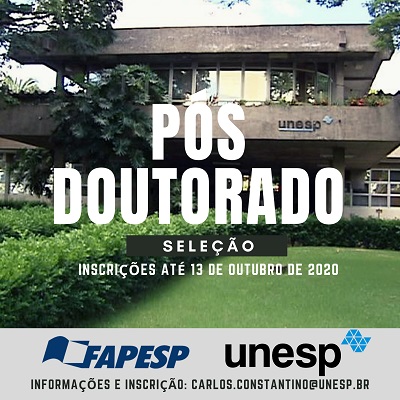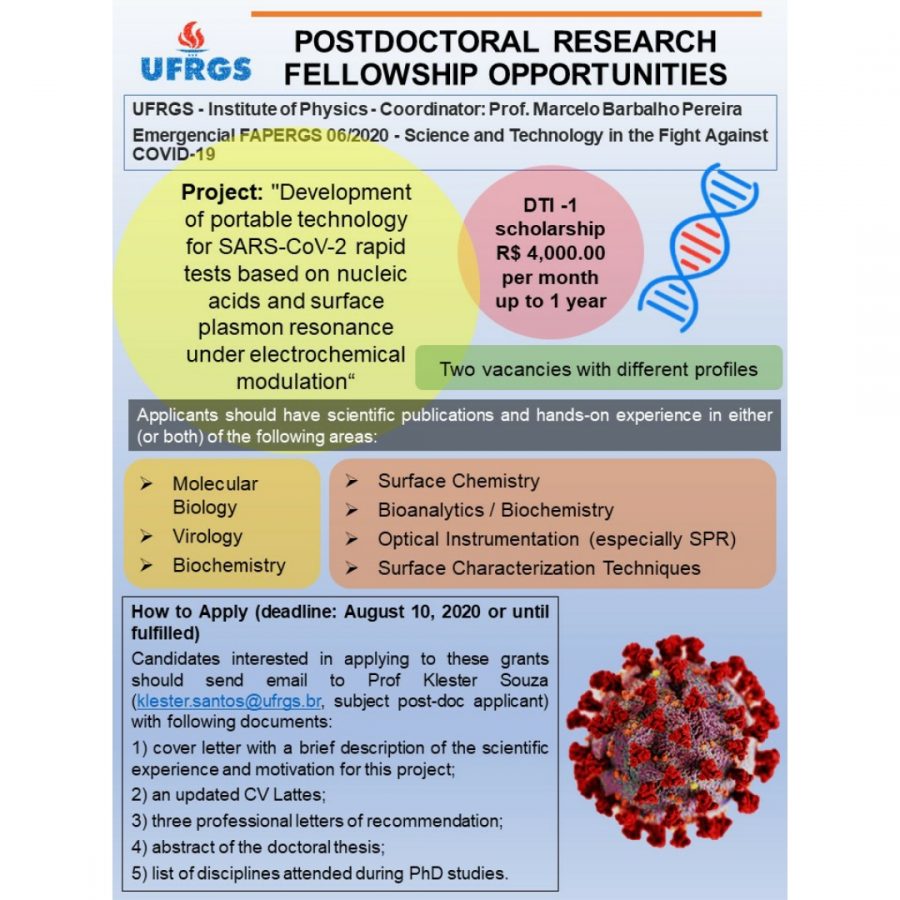Sorry, this entry is only available in Brazilian Portuguese.
Category: Opportunities
Postdoctoral Fellowship at UNESP.
 *Opportunity: the Laboratory of Nanostructured Materials for Environmental and Biological Analyses invites applications for a post-doctoral research fellowship funded by São Paulo Research Foundation (FAPESP: https://www.fapesp.br/en). This fellowship is linked to the Thematic Project “Toward a convergence of technologies: from sensing and biosensing to information visualization and machine learning for data analysis in clinical diagnosis” (FAPESP process number: 2018/22214-6).
*Opportunity: the Laboratory of Nanostructured Materials for Environmental and Biological Analyses invites applications for a post-doctoral research fellowship funded by São Paulo Research Foundation (FAPESP: https://www.fapesp.br/en). This fellowship is linked to the Thematic Project “Toward a convergence of technologies: from sensing and biosensing to information visualization and machine learning for data analysis in clinical diagnosis” (FAPESP process number: 2018/22214-6).
*Supervisor: Carlos José Leopoldo Constantino (full professor).
*Institution: Department of Physics, São Paulo State University (UNESP), campus in the city of Presidente Prudente, São Paulo State, Brazil (https://www.international.unesp.br/).
*Fellowship components: it includes a monthly stipend (R$ 7,373.10) and research contingency funds (15 per cent of the annual value of the fellowship for using in activities developed by the Fellowship holder, strictly related to the fellowship research project).
*Duration of the post-doctoral fellowship: up to 48 months (starting: December/01/2020 or as soon as possible; ending: up to February/28/2025).
*More info/fellowship: https://www.fapesp.br/en/postdoc
*Candidate requirements: she or he should have concluded the Ph.D. less than seven years before the beginning of the post-doctoral fellowship. Applicants must have a Ph.D. in physics, chemistry, materials science or related fields. The successful candidate must have excellent communication skills and excel in a highly collaborative research environment. In addition to the timely publication of research results in peer-reviewed journals, the responsibilities of the post-doctoral include drafting progress reports. The successful candidate will conduct research on: Detection of pesticides using surface-enhanced Raman scattering (SERS) spectroscopy. Therefore, this research includes experimental activities using techniques such as:
(i) Synthesis of colloid of metallic nanoparticles applied as “SERS substrate”.
(ii) Characterizations of the “SERS substrates” through microscopy, UV-Vis extinction spectroscopy, zeta potential, and dynamic light scattering (DLS).
(iii) Micro-Raman and surface-enhanced Raman scattering (SERS) spectroscopies.
(iv) Computational methods for data analysis.
*Deadline for application: October/13/2020.
*Application: interested individuals should send to carlos.constantino@unesp.br the following documents:
(i) CV with the list of publications.
(ii) Two letters of recommendation.
(iii) Work plan: 4-pages maximum with title, justification, objectives, and methodology.
Available facilities (basic):
https://www.fct.unesp.br/#!/departamentos/fisica-quimica-e-biologia/laboratorios/
(Português) Oportunidade para pós-doc com experiência em nanopartículas de ouro e moléculas biológicas em projeto de combate à Covid-19.
(Português) Doze bolsas de doutorado em projeto de materiais autodescontaminantes para impressão 3D na UFPE.
Special issue on latest development of nanotechnology in Latin America.
Dear Authors
We are organising a special issue for Journal of Chemical Technology and Biotechnology (JCTB) (published by Wiley, Impact Factor = 2.75, https://onlinelibrary.wiley.com/journal/10974660). We would like to invite authors to submit contributions.
The theme of this special issue is Latest Development of Nanotechnology in Latin America. We would particularly encourage new academics for contribution as we aim to promote research works in nanotechnology with new ideas. Initially, we have set several key areas for the issue:
– Nanotechnology applied to sensors and biosensors
– Nanoparticles and its interactions with plants
– Risk assessment of nanomaterials
– Drug delivery systems
– Development of new functional organic, inorganic and hybrid materials
– Nanotechnology applied to gene transfer
– Molecular simulations in nanotechnology
– Bio-based nanomaterials aiming agriculture and environmental applications
– Magnetic nanomaterials and its applications
– Nanoparticles aiming topical applications
– Biomimetic silica nanoparticles
– Hybrid biofilms aiming for food applications.
We aim to set the deadline for December 31st and to publish the special issue online in 2021. JCTB does not impose publication charges but it provides open access options with a fee.
Once the invitation is accepted, please inform one of the Guest Editors prior to manuscript submission.
Submissions should follow the general guidelines for submitting an article to a Special Issue in JCTB:
- Authors should consult the author guidelines for details relating to formatting and article types. These can be found at:
http://onlinelibrary.wiley.com/journal/10.1002/(ISSN)1097-4660/homepage/ForAuthors.html
- Authors should submit their papers using the manuscript submission system at: http://mc.manuscriptcentral.com/jctb-wiley and should mention the Special Issue in the cover letter.
- Authors must ensure they select “YES” when asked if their paper has been invited for a Special Issue during the submission process. They should also enter the name of the Special Issue in the field provided.
- Authors should suggest at least two referees for each paper with email contact information.
- Authors should submit their papers in the given time frame. Please contact the guest editor if you encounter any problems with meeting the submission due date.
- All papers will be subject to the journals usual, rigorous, peer review process and papers will be handled by an editor from the journal.
- If you would like your images to be considered for the cover, please email your suggestions to covers@wiley.com once your article has been accepted for publication.
If you have any further enquiry, please contact us.
Best Regards
Guest Editors:
Dr. Renata de Lima (University of Sorocaba, Brazil)
Dr. Leonardo F. Fraceto (UNESP, Brazil)
Dr. Humphrey H. P. Yiu (Heriot-Watt University, UK)
Contact: leonardo.fraceto@unesp.br and h.h.yiu@hw.ac.uk
(Português) Bolsas de doutorado em projeto de materiais antimicrobianos na UCS.
(Português) Bolsas de doutorado em projeto de materiais e sensores para Covid-19 na UFABC e LNNano.
(Português) Seleção extraordinária de candidato(a)s ao doutorado em Química da UFSCar.
Postdoctoral research fellowship opportunities.

